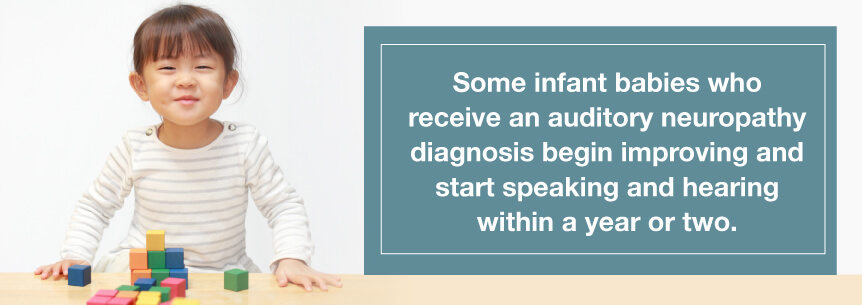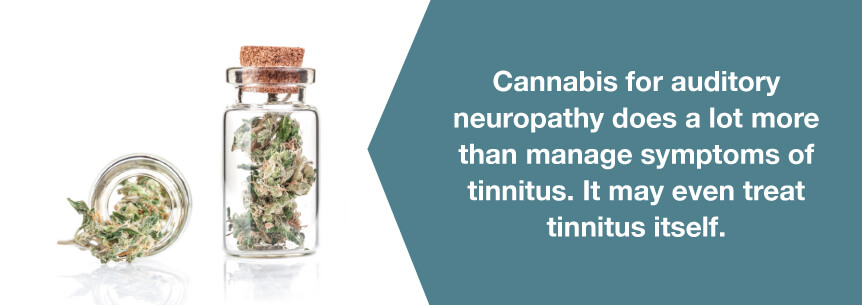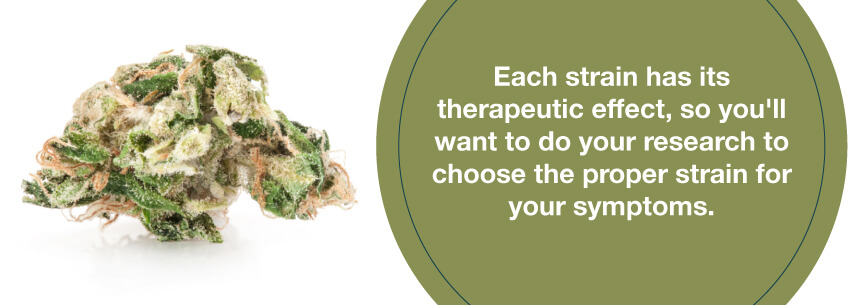If your physician diagnosed you with auditory neuropathy, you’re likely frustrated with how it’s affected your hearing. If it’s mild, it might only be a slight annoyance to you. However, if it’s severe and involves moderate or extreme hearing loss, it may impact your quality of life and how you interact with others and the world. Continue reading as we explore the benefits of medical marijuana and auditory neuropathy for this disorder.
Auditory neuropathy spectrum disorder (ANSD) is a type of hearing condition where you can successfully detect sound with your inner ear, but you have an issue sending this sound to your brain from your ear. Individuals with auditory neuropathy can have hearing loss ranging from mild to severe. Their speech-perception abilities could be poor, which means they can’t understand speech clearly.
Individuals with ANSD have greater speech perception impairment than hearing professionals would predict from the hearing test’s results of their degree of hearing loss. For instance, someone with the disorder might be able to hear sounds, but they still find it hard to recognize spoken words. They may hear sounds fading in and out, or the sounds may seem out of sync for them.
ANSD affects individuals of all ages, from infants to adults. It’s not known how many people have the disorder, but present information suggests ANSD plays a significant role in deafness and hearing impairments.
Medical experts indicate numerous possible causes of auditory neuropathy. Disease or trauma may cause it, or you can inherit it genetically. Some common causes of the disorder include:
In children with this hearing condition, there is a wide range of individual differences. For some kids, their hearing might improve with time — usually when the condition links with hyperbilirubinemia or prematurity.
While anyone of any age can develop this condition, known risk factors of ANSD in children include:
Researchers propose two main types of auditory neuropathy spectrum disorder exists:
Certain symptoms to look out for with auditory neuropathy include:
Also, one study reported nearly 64 percent of people with ANSD experience tinnitus.
The most common physical effects of auditory neuropathy are hearing and speech difficulties, both in children and adults. In individuals with ANSD, they can get better or worse, remain stable or slowly worsen, depending on the underlying cause.
Some infant babies who receive an auditory neuropathy diagnosis begin improving and start speaking and hearing within a year or two. Others remain the same, and some start getting worse, showing signs that they no longer have functioning of their outer hair cells.

Researchers conducted a study on 47 3-year-old children to determine ANSD’s influence on language, speech and psycho-social development. Out of the children with ANSD, 64 percent have mild to severe hearing sensitivity loss. The other remaining children have extreme hearing loss. Twenty-seven children at the age of 3 used hearing aids, 19 of the children used cochlear implants and one didn’t use a hearing device. Also, 30 percent of children had other disabilities along with hearing loss.
Between children with ANSD and without, there wasn’t any substantial variability or difference in performance levels, both for the kids using hearing aids and those using cochlear implants.
Another study conducted to determine the severity of anxiety, depression and stress in young adults and adolescents with ANSD used the Depression Anxiety Stress Scales (DASS). Twenty people with the condition underwent DASS.
Researchers were attempting to find the correlation of severity of depression, anxiety and stress with the onset of ANSD, speech identification scores and degree of hearing loss. The study results showed people with auditory neuropathy had moderate anxiety and depression, with females showing more symptoms than males.
The study concluded those with ANSD experience anxiety and depression, probably due to inadequate management options available to them. Therefore, there’s a need for the development of appropriate management strategies for patients with auditory neuropathy, as well as appropriate referral for psychological issues management.
A report presented at the fourth ACFOS international Conference revealed the following about auditory neuropathy:
Late in the 1970s, clinical researchers started describing groups of individuals with slightly elevated or normal audiogram pure tone thresholds found with severely abnormal or absent auditory brainstem responses. In the mid-1980s, with the arrival of otoacoustic emissions, these groups of individuals showed normal cochlear function.
In 1996, researchers defined normal cochlear function co-occurring with abnormal brainstem responses as ANSD.
Although ANSD doesn’t have a cure at present, children with auditory neuropathy can benefit from assistive listening devices (ALDs) by being able to develop language skills and make sense of sounds. Your doctor will decide which devices are appropriate to you or your child. ANSD treatment will depend on your age and how severe the condition is at diagnosis.
Ongoing speech-language pathologist therapy is an essential part of the effectiveness of any device. These professionals help patients with hearing loss in developing hearing and speaking skills.
Here are some examples of ALDs.

When it comes to children with ANSD communicating effectively, there isn’t one approach that works for all kids with the condition. It’s helpful to work together closely with experienced professionals of this condition.
Scientists have found genes contributing to some auditory neuropathy cases. They’re working now to identify what goes wrong in a person’s auditory system when they inherit a mutant gene. They’re also investigating the possible benefits of cochlear implants for kids with ANSD and are evaluating why these implants help some individuals with ANSD, but not others.
Vestibular and auditory medication is starting to become more accepted as its own specialty — medical neurotology. Recent advances in this industry have been influential in understanding the pathophysiology, scientific foundations and clinical management of those with vestibular and hearing conditions.
One study conducted back in 1976 tried finding an association between smoking pot and hearing. Researchers in this study tried finding a “negative” connection between the two by conducting hearing tests. During the study, researchers gave half the study participants cannabis and the other half placebos. They all took a preliminary hearing test before they smoked the herb.
Even with the researchers’ preconceived prejudice against cannabis, they couldn’t find marijuana had a negative impact on any of the study participants’ hearing. However, they didn’t find much positive correlation between smoking the herb and hearing, either. The participants did well on their hearing tests both before and after smoking marijuana.
Another study set out to determine if tinnitus is a big problem in people with ANSD. Results showed there was a moderate degree of functional impairment-related tinnitus and a moderate severity degree in those with ANSD. According to the study, tinnitus also causes functional impairment, resulting in emotional issues, sleep disturbances and affects the quality of life.
Tinnitus is the result of an auditory system disruption, which means there’s a disconnect between the ears and the way in which the brain perceives auditory signals. Researchers found the brain can learn sensitivity to particular stimuli — known as plasticity.

Cannabis for auditory neuropathy does a lot more than manage symptoms of tinnitus. It may even treat tinnitus itself. The endocannabinoid system (ECS) can control brain plasticity, and the receptors act as a bridge between the mind and body. The ECS is extremely sensitive to medical cannabis therapies. Plasticity tinnitus causes, like chronic pain, shows improvement with medical weed use.
Not only can marijuana and auditory neuropathy treatment help tinnitus associated with the condition, but it can also tackle some of its symptoms, such as:
Medical pot dispensaries sell cannabis in strains capable of treating specific symptoms. Many strains of medical cannabis for auditory neuropathy can be helpful in treating tinnitus symptoms. Each strain has its therapeutic effect, so you’ll want to do your research to choose the proper strain for your symptoms. A local dispensary budtender or cannabis doctor can help you. Certain symptoms and their associated strains include:
Strains for Insomnia
Strains for Depression
Stress and Anxiety

Consume your cannabis and auditory neuropathy treatment in numerous delivery methods.
Improve your symptoms by exploring marijuana for auditory neuropathy. Here at Marijuana Doctors, we can help you find a qualified cannabis doctor who is thoroughly screened and compliant with the laws in your state and provide you with an expansive list of dispensaries where you can buy your cannabis products.
Book your appointment for a consultation with a marijuana doctor so you can take the next step at finally finding relief from your ANSD symptoms. We encourage you to browse through our extensive resources for medical cannabis.
Find A Doctor Find A Dispensary